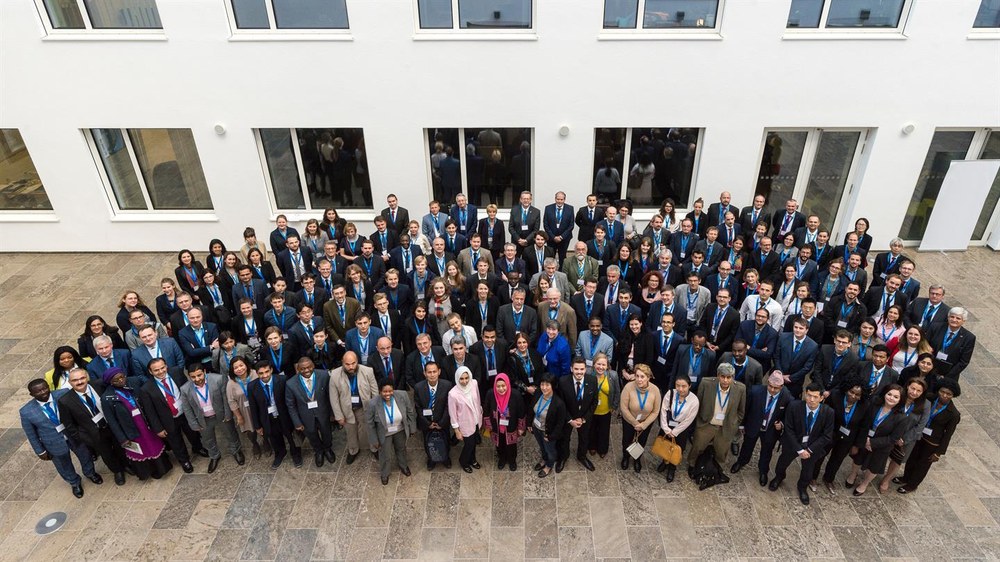UN Germany High Level Forum 'The Way Forward after UNISPACE+50 and on Space2030' in Bonn



The United Nations High Level Forum 'The Way Forward after UNISPACE+50 and on Space2030' was held in Bonn from 13 to 16 November 2018. Over 300 participants from some 60 countries gathered in the federal city to discuss how aerospace applications can contribute to solving global challenges in future. The event was organised by the United Nations Office for Outer Space Affairs (UNOOSA), the German Federal Ministry for Economic Affairs and Energy (BMWi), the European Space Agency (ESA) and the German Aerospace Center (Deutsches Zentrum für Luft- und Raumfahrt; DLR).
"Aerospace activities require strong collaboration between governments, space agencies, international organisations and private stakeholders," emphasised Thomas Jarzombek (Member of Parliament), Federal Government Coordinator of German Aerospace Policy, in his opening address. "Only if we work together will it be possible to unleash the full potential of space sciences and technology, in order to achieve our global development goals and ensure the sustainable use of space."
Representatives from government, administration, industry and civil society attended the high-level gathering to discuss the resolutions of the UNISPACE+50 Conference, which took place in Vienna in June 2018. The event focused on how space applications can contribute to achieving the UN sustainability targets enshrined in the Space2030 Agenda, as well as on the issue of space law, which mainly addressed the preservation of existing agreements. The more than 70 talks and presentations addressed issues such as exploration, the prevention and monitoring of space debris and environmental monitoring from space.
"Designing the Space2030 Agenda is extremely important to achieve the best possible and most effective use of space technologies and applications in the interest of sustainable development," said Pascale Ehrenfreund, Chair of the DLR Executive Board. "Science, technology and innovation are key components of the Agenda and it is important to link them more closely with development cooperation and the private sector and thus better integrate space activities into national development plans."
Greetings from Alexander Gerst
A special kind of video message was beamed down to the participants from space. "Hello from the International Space Station," said the German ESA astronaut Alexander Gerst, welcoming the conference guests. "It is a delight to see you all gathered in Bonn to share a common vision for aerospace and to set the course for the Space2030 Agenda." Alexander Gerst reminded the attendees that the unique research platform ISS would never have been possible without international cooperation. "The direction in which space exploration will proceed in years to come rests in your hands, which is an immense responsibility – as it requires a visionary spirit and the ability to see far beyond the limits of our current horizon," continued Gerst.
Long-term support for the UN SPIDER Office in Bonn
There was good news from the area of international cooperation in the area of disaster relief: "I am delighted to inform you that DLR will be able to support the UN SPIDER Office in Bonn through its next phase of implementation thanks to its close cooperation with the University of Bonn," explained Walther Pelzer, DLR Executive Board Member responsible for the Space Administration. The UN SPIDER Programme (United Nations Platform for Space-based Information for Disaster Management and Emergency Response) was established as a UNOOSA programme by the General Assembly of the United Nations 2006. It ensures that all countries have access to space-based information and are able to contribute to its expansion, in order to strengthen the entire disaster management process. BMWi and DLR, through its Space Research and Technology area, have been contributing human and financial resources to UN SPIDER for the last 10 years.
Knowledge transfer to developing and emerging nations with DLR_School_Labs
There was also a novelty to report from the DLR_School_Labs in the area of 'Capacity building'. Aerospace has great potential to fascinate and inspire young people. The Education Department at DLR will therefore cooperate with UNOOSA to organise a one-week workshop for teaching staff from various countries, mainly in developing and emerging nations. This will also involve visits to a number of DLR_School_Labs and some joint workshops.
"Building on the success of UNISPACE+50, the 2018 High Level Forum provided a platform to ensure that the benefits of recent advances in space reach everyone everywhere, and to discuss space conservation measures for future generations," said UNOOSA Director Simonetta Di Pippo. “The purpose of the Forum was to formulate proposals for a Space2030 Agenda, which is being prepared in detail in the United Nations Committee on the Peaceful Uses of Outer Space (UNCOPUOS) based on ideas put forward by the international aerospace community. This Agenda is intended to ensure the long-term of use of space for peaceful purposes. Another key objective was to enable the optimised deployment of aerospace applications and technologies for supporting the implementation of international climate targets enshrined in the 2030 Agenda for Sustainable Development, the Paris Climate Agreement and the Sendai Framework for Disaster Risk Reduction.
